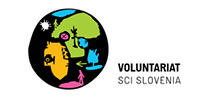Tips and Tricks
In this section we have selected practical tips and tricks from the field of Sustainability containing information that will help you in the preparation and during workcamps.
Please, see details in following chapters
Transportation
Train
Not only is it the most environmentally friendly form of public transport, it's also comfortable, safe and, compared to a bus, you won't be stuck on the motorway and can enjoy the views of the surrounding countryside. There are hundreds of breathtaking train routes around the world that offer not only stunning scenery but also a unique experience.
Coach
As travelling by train, another sustainable means of transport is coach. You can also enjoy the views but furthermore, it is usually a more sustainable option for your bank account.
Car
Even a car journey, if it makes more sense in your case, can be more environmentally friendly. If you're driving, try offering free seats to other travellers on the BlaBlaCar platform, for example. Not only is it more eco-friendly, it's also financially worthwhile as you'll most likely share the cost of the fuel - plus you'll get the chance to meet new people. It works the other way round too, try joining someone. If you're not going far, you're not limited by time and you're spontaneous you can try hitchhiking.
TIP: platform BlaBla Car
Airplane
Air transport is the worst mode of transport in terms of carbon footprint. For shorter distances, try greener modes of transport or flights with the fewest connections. Most gases are released during take-off and landing. However, for longer distances, it can sometimes be more worthwhile to fly by plane than to drive alone.
Another tip is to use economy class seats. First and business class seats are larger, so they carry fewer people for the same amount of fuel. Also, use e-tickets instead of printing out your ticket. It's a small thing, but it will also help save some of that stuff.
Try to avoid food on the plane, it is pretty much packed and recycling is out of the question. Therefore, ideally pack a snack to take with you, as it certainly doesn't matter to airport security. If you get thirsty on the plane and didn't manage to refill your water bottle in the lavatory before your journey, you can ask for a refill in your own mug or bottle.
Getting around the city
Walking
If it is possible. explore the area by foot. This is by far our favourite way to travel and it has zero impact on the environment while keeping you healthy.
Bicycle
Cycling is a great way to get to know a new place. Usually it doesn’t cost as much as renting a car or scooter. Besides manufacturing, cycling has no impact on greenhouse gas emissions. Cycling around it’s a great way to exercise and spend more time outdoors to keep your body and mind healthy. If you travel far, you can also rent an electric bike.
TIP: app Bikemap
Bikemap app gives you access to the world’s largest cycle route collection. They’ve mapped over 9 million bike paths, so you can find a nicer, quieter and safer route to where you want to get to on two wheels.
Public transport
If you can’t walk or cycle, buses, trains, trams or metro can still help to reduce the number of vehicles on the road, cutting emissions and improving the quality of our air. Indeed, compared with driving alone, taking public transportation reduces CO2 emissions by 45%.
In some destinations, transport in and around the cities is very well organised. For example, the Netherlands, Germany, Belgium, France, Denmark, Japan, Great Britain, Austria or Spain are among the countries that are rated as the best in terms of public transport accessibility.
Did you know that in Luxembourg, which is one of these top picks, you can use public transport throughout the country completely free of charge? Isn't that amazing? You'll save money, help nature and enjoy a beautiful view along the way while someone else drives.
TIP: app Citymapper
Citymapper calls itself ‘the ultimate transport app’. It’s a super-useful app for finding your way around a city, and it’s especially good at showing you the best public transport routes. Citymapper’s maps are available in major cities across the world, and their coverage is strongest in Europe, but it’s still a good idea to check they’ve got coverage of the city you’re after as it doesn’t yet cover everywhere.
Car
There are some destinations where public transport is not well organised or does not go to some places at all. If it's too far and you can’t walk there or ride a bike, you can try to hitch a ride (but beware of this in more dangerous destinations) or use a car-sharing system (whether you offer it or are just looking for a carpool). You can use the BlaBlaCar app as was mentioned above or ask around in relevant Facebook groups. If you really have to rent a car, opt for an electric or hybrid.
TIP: app Plugshare
Plugshare is an app that makes it easier to find a spot to recharge your electric car. It’s therefore only applicable if you’ve already made the switch to electric, but if you have it’s a great sustainable app to find your nearest charger when you are out on your travels.
Accommodation
Airbnb, Couchsurfing, BeWelcome and VegVisits
When you stay through Airbnb, you're supporting specific homeowners, not the corporations behind the big hotels, which can help the local economy a lot. Couchsurfing or BeWelcome are great ways to meet locals and really blend in with the local community.
If you're looking for something else more sustainable, try VegVisits. It's a service similar to Airbnb designed for vegetarians and vegans. You can rent not only accommodation in a meat-free home, but feel free to just rent a meat-free kitchen for a few hours when you need to cook. The service is available for locations around the world, but there certainly aren't as many listings as on Airbnb.
TIP: platforms Couchsurfing, BeWelcome, VegVisits
Campsite
If you’re committed to sustainable travel accommodation and love the outdoors, then camping is a great option. There are many environmental benefits and camping areas tend to be less built-up and more integrated in nature.
Hotels
Hotels are probably one of the least sustainable alternatives for accommodation, but if they're your choice, we've got some tips on what you can do more frugally next time.
Disposable cosmetic bottles are cute, but not eco-friendly. If you need to use them, use them whole, take them away, reuse them with your own refills. If you use half of them, the cleaning lady will throw them away.
The thing that can save a lot of energy is reusing towels. Fortunately, even hotels have figured out that washing towels after every guest every day is pointless, and they encourage visitors to place the towel in a specific location if they want to continue using it, so the cleaning service won't needlessly wash it after one use. A related tip is to put a "do not disturb" sign in your room. This will not only save you resources devoted to washing towels, but also to cleaning the entire room.
Turn off the lights and air conditioning when you are not there. Energy-consuming non-stop air conditioning is unfortunately standard in some places. The last tip with hotels is ideally to look for ones that have some of the sustainability certifications. This may include certifications such as EarthCheck, Green Globe, Rainforest Alliance or Green Tourism. These certifications mean that the hotel in question is trying to adhere to certain environmental standards.
TIPS:
Avoid large resorts - they have negative impacts on the local environment due to their water and energy consumption. Washing towels and changing bed sheets daily are common in large resorts and waste energy and water.
Avoid all-inclusives - all-inclusive package holidays often mean you pay up-front for your accommodation, food and activities. This means tourists have little incentive to go elsewhere and often do not go out to local restaurants, hire local tour guides or participate in cultural activities. Resort accommodation in all-inclusives tends to be foreign-owned and this means tourist money doesn’t benefit the local economy. All-inclusives tend to not be sustainable for these reasons. If you do prefer the ease of all-inclusive travel, look for locally-owned resorts and opt to go half-board or not to have activities included so you can enjoy supporting local businesses.
Eco aids
Own water bottle
Nobody wants to spend money on bottled water in plastic bottles. Not to mention all the avoidable waste. Think about where you're going and what kind of bottle you could use. For example, there are metal thermo bottles that keep your water cold and refreshing. If you're going to a country where you can't drink tap water, you can look for a bottle with a filter.
TIP: app Refill
Refill is great for cutting back on plastic waste when you’re out on your travels. It helps you find places where you can use your refillable containers. They’ve mapped over 274,000 Refill Stations offering water refills globally, so you can always find somewhere to fill up rather than having to buy a plastic bottle.
Own cutlery
Whether you take the metal one from the kitchen or get a travel one, see how much easier it makes your travels.
TIP: Every sports shop and online store sells travel cutlery. Check out Spork ,for example, but you can also find cutlery made of bamboo, metal or bioplastic.
Reusable straw
Metal, glass, just one that you won't throw away after one use - don't forget to ask the staff in shops/restaurants not to give you any straws.
Jar
A wider jar is something that can make up for a few other things if you're really into saving space. Not only that you can use it as a thermo mug (and in the summer time as a jar for various smoothies or cocktails), but it will also come handy in place of a food box. If you have leftovers at a restaurant, you can simply move them into your jar and finish them at home. Luckily, a jar is not something you have to lug around from home: just buy some at the destination. If you use the jar for a takeaway drink, you can even get a discount on it at some cafes.
Cloth shopping bag and cloth bags for fruit or bread
Don't forget to bring your own shopping bags, which will take up no space and will be useful for shopping. If you know you'll be buying fruit, vegetables and baked goods on site, don't forget your own (cloth) bags. This will save you a lot of plastic.
Hygiene and body care
Travel set of empty bottles (100 ml)
You can fill them with your usual shampoo or shower gel and take them on the road. When you return from your trip, you can eventually wash them out and use them again and again next time. These bottles are the size required by airlines, so you can easily take them in your hand luggage on the plane.
Solid shampoo
Besides its use as a shampoo and body wash, it can be used as a laundry or dishwashing detergent. Don't forget to pack a solid deodorant or hair conditioner too.
Bamboo toothbrush
Saves both the environment and the weight of your luggage.
Toothpaste and mouthwash in tablets
Want to travel light and minimise the liquids you take with you? Then you'll appreciate this "hack" that saves you space and weight, plus tastes great and is environmentally friendly. Compared to toothpaste, they're 100% natural, save water and break down naturally so you can spit them out right away.
Sunscreen
Unfortunately, conventional sunscreens are largely made up of harmful substances - not only for the sea and the coral reefs in it, but also not the best solution for your body. So try getting a natural sunscreen such as those from laSaponaria, Ey! or Eco Cosmetics.
Insect repellent
Repellent is a necessity in many countries if you want to "survive" there. But if you look at the ingredients of conventional repellents, you will find that although they repel mosquitoes quite well, they are not healthy for the human body. That's why it is better to focus on natural formulas, such as those from brands like Incognito or Navia.
Food
Local shops, farmer’s markets
Try to go to local shops or farmers markets. Local food ensures freshness and benefits local businesses. In fact, locally produced food does not require transportation, so it is fresh and nutritious. Furthermore, eating local products supports the local economy and contributes to increasing employment and income within a community.
You can also use packaging-free shops for buying food. You can search for them on Bulk Locator which is an app's waste-free map.
TIP: app Bulk Locator
Eat in restaurants or cafes owned by locals
Eat in local restaurants and cafes, it is a great way to meet locals who are enthusiastic about you trying their traditional food. Avoid international food chains like McDonald’s where your money doesn’t contribute to the local economy.
If you see a street food stall that looks like it's keeping hygienic conditions, don't be afraid to try "street food", which is a real treat in most countries. Not only will it give you a unique experience and a taste of honestly made local specialties, but you'll also be supporting the local community and economy.
TIP: app EatWith
Eatwith is an app where you can have dinner with a local family. From dinner parties to food tours to cooking classes, you can join hand-selected locals in 130+ countries for unforgettable experiences you'll always remember.
Eating without meat
Many individuals who are concerned about the state of the environment are vegetarians or vegans. Whether you are also or not, you may still appreciate a meat-free meal from time to time. The HappyCow website is great for finding places to eat vegan or vegetarian. It will find you not only purely meat-free restaurants, but also places that offer at least meat-free options, all over the world. You can download their HappyCow App.
TIP: app HappyCow
Apps for reducing food waste
Too Good To Go
The Too Good To Go app lets you get delicious food from restaurants and cafes that would otherwise go to waste. You get to prevent food waste, and you get tasty food at a great price.
Olio
Olio is also an app for preventing food waste, in some ways a lot like Too Good To Go, but it also connects you to neighbours who have surplus food that they can share rather than throwing away. As well as connecting you to people with food to give away, Olio also lets you lend or borrow household items.
Shopping
Locally-made clothing, secondhand
Shop sustainably and consider who made your clothes too. It’s better if you can source clothing made on an ethical production line where workers are safe and paid a fair wage.
Through purchasing clothing at thrift stores, you give a second life to items that could otherwise end up in a landfill. And by purchasing locally-made items, you can take home a piece of your destination, while supporting a business based directly in the place you are visiting.
TIP: app Good On You
Good On You is an app for ethical brand ratings – so when you’re out shopping you can quickly check how sustainable (or not) the item you’re looking at is. They rate each clothing brand on its treatment of the planet, people and animals so you can be sure what you’re wearing supports the causes you care about.
Gifts and souvenirs
Do you want to bring a gift for your family or buy yourself something to remind you of your journey? Try going to a market instead of a commercial gift shop, or a shop that sells locally made goods (bags, groceries, etc). Not only will your purchase contribute to a great project, and the funds stay local, but these gifts always make you happier - because they're double - they delight and have meaning.
Getting to know local life
Slow down and stay awhile
Do yourself a favour and give yourself more time to explore the destination. Instead of taking multiple shorter trips each year, opt for just one longer vacation. Once you’ve reached your destination, park yourself in one area for a while instead of hopping from one place to the next. Slowing things down will allow you to really experience the place you are visiting.
When you aren’t rushed, you can take time to immerse yourself in the culture, build deeper connections with local people, and get to know the destination’s unique charms. Take a cooking class to taste the local flavours and learn how to make traditional dishes. Spend a day walking or cycling around town and you’ll be sure to discover hidden gems like a quirky local coffeehouse.
Support locals
If you want to go on a trip while being abroad, choose tour operators and activities that prioritise sustainability and respect for local cultures and environments. When a travel company has membership with the International Ecotourism Society, it is behaving responsibly and sustainably. Engage in activities like wildlife watching, hiking, or cultural tours that have minimal impact on the ecosystem.
Respect locals
Through travel, you get a unique peek into traditions and ways of life in a new place. Research the location's etiquette before arriving. Learn a few local phrases to communicate with locals. Dress appropriately and be mindful of religious sites. Some places require taking off shoes, covering shoulders, or even speaking quietly.
Obey the local laws and guidelines, from traffic rules to health and safety precautions. Do your best to leave places like you found them so that future generations of travellers and residents can enjoy them too. A little bit of respect goes a long way – be considerate of local people and treat them with dignity. This includes honouring their privacy and asking permission before you take a photo of locals.
Workaway
One of the ways to get to know the local life and help the locals is Workaway. You can find someone to help in exchange for accommodation and food.
Natural wealth
Preserve natural and historic heritage
Before you head out into the countryside, make sure you know where to stick to marked paths or know other regulations you have to follow on the route. You may be tempted to venture outside of the permitted areas to "get that perfect insta-photo", but think about how you can damage nature by doing so. You could disturb a unique piece of nature that has been there hundreds or thousands of years. The same goes for historic sites and buildings that already suffer from an overabundance of tourists. Be respectful so that other people after you can enjoy these beautiful places.
National parks and protected areas
Visit national parks, marine sanctuaries, and other protected areas, they play an important role in protecting the planet’s natural resources and biodiversity. Many countries rely on tourism fees such as entrance fees or operator permits to preserve these special places and animals. The money helps fund the conservation activities necessary to protect these areas while also providing income to local communities.
Snorkel and scuba dive responsibly
If you’re snorkelling or scuba diving, be careful not to tread on the coral as this can damage the fragile ecosystem. If we want to preserve the beautiful reefs, we must snorkel and scuba dive responsibly. When you snorkel or dive, go with smaller groups to avoid overcrowding. Do not try to touch or feed fish or animals. Make sure to wear reef-friendly sunscreen.
Behaviour on site
Clean up not only after yourself
Leaving only footprints and nothing else is basic. You can also help by taking a bag on the hike and carrying the waste that wasn't yours. If you would like to take part in an organised clean-up, join a clean-up group. Trash Hero is quite popular - a group that was started by a few Czechs cleaning up trash on the beach, and now has branches all over the world.
Reduce, Reuse, Recycle
Maintain your environmentally friendly habits while travelling. Minimise waste by carrying a reusable water bottle, shopping bag, and utensils. Avoid single-use plastics whenever possible. Look for recycling bins and dispose of your waste responsibly, even if local recycling facilities are limited.
Do not support animal cruelty
Popular dolphinariums or elephant rides are activities that most people don't think about. Many places that allow some form of "safari" violate animal rights, hurt, abuse and torment animals. Always check the internet for recommendations of ethical places that treat animals with respect. Definitely avoid riding any wild animal, or petting or taking photos with them (e.g. tigers, lions). These animals are tortured from a young age, harshly trained, chained or drugged and kept in captivity their entire lives. These kinds of "animal trafficking" are a big problem within tourism.
An exception may be shelters (you will often see them under the term sanctuary), where animals are not used for entertainment for tourists, but are instead rescued from these "entertainments" and roam in nature on the organisation's property. However, it is important to check beforehand what the reputation of the place is and whether it is just another tourist attraction. It can be a positive sign that the animals are not put on any shows and are allowed to live as they naturally would.
Conserve water and energy
When you’re on vacation, do what you can to conserve local water and energy resources. Turn off the lights, TV, and any other electronics when not in use. When leaving your accommodation, turn off the AC or set the thermostat a few degrees higher. Take a shower instead of a bath and keep it as short as possible. Handwash your own clothes and hang up the “Do Not Disturb Sign” to prevent unnecessary laundering.
Avoid “Slum tourism”
What we definitely recommend avoiding is participating in so-called slum tourism (sometimes referred to as poverty tourism). In some countries, local travel agencies offer e.g. day trips to the poorest parts of cities, where tourists take photos of people living there in various situations and then have the photos as a "curiosity/trophy". At worst, they share them on social media. Any kind of mutual human respect has completely disappeared in this controversial tourism industry, and sharing these photos only encourages negative stereotypes and does not give an objective picture of life in the country. None of us would like to be photographed in an uncomfortable situation and still have the photo shared with other people.
Workcamp
By going to your dream destination to workcamp you are guaranteed to live like a local and be in direct contact with the local community. Workcamps usually last 1-3 weeks, during which time you help the local community through service work, learn from each other and exchange experiences. You also have time to travel and explore the country, the local culture, customs and life in general.
TIPS: Documents and videos about sustainability
- David Attenborough: A Life on Our Planet
Video A Plastic Ocean - The Story of Plastic
- Video Animal Exploitation Uncovered
- The Last Tourist













